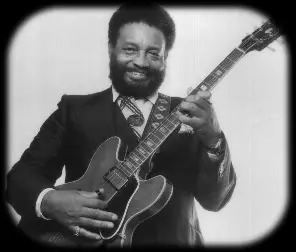LOWELL FULSON
 Lowell Fulson was a pioneer of West Coast Blues, a laid-back singer who wrote many classic songs and played his smoking guitar lines for a worldwide audience for half a century. He adapted his music for the times, playing hard Blues, Funky Soul and driving R&B, but never compromised his fluid yet penetrating style.
Lowell Fulson was a pioneer of West Coast Blues, a laid-back singer who wrote many classic songs and played his smoking guitar lines for a worldwide audience for half a century. He adapted his music for the times, playing hard Blues, Funky Soul and driving R&B, but never compromised his fluid yet penetrating style.
Born in Tulsa OK in 1921, Lowell grew up listening to Texas Blues and Western swing on the radio.
He joined up with Blues singer Alger ‘Texas’ Alexander around 1940, playing his sharp guitar lines in the local clubs, but that stopped when he was drafted. In 1946, Lowell was discharged from the Navy in Oakland, where he teamed up with producer Bob Giddins. They had a string of hits, including Lowell’s 1948 song ‘Three o’clock Blues’, which was later to become BB King‘s breakthrough number, and an adaptation of a Memphis Slim song, which Lowell cut as ‘Every Day I Have the Blues’. Lowell’s follow-up ‘Blue Shadows’ topped the R&B chart a few months later, and a busy touring schedule saw him fronting a red-hot band with Stanley Turrentine on sax and pianist Ray Charles, who would later have a big hit with Lowell’s song ‘A Sinner’s Prayer’.
Lowell’s ‘Blue Shadows‘ went to the top of the R&B charts;
In 1954 Lowell signed for Chess Records, and his debut song for them was ‘Reconsider, Baby’, giving them a big hit and a new classic. Lowell’s steady output for Checker did not produce any more big hits, but when Lowell moved to LA in 1962 and switched to the Kent label, his career picked up and ‘Black Night’ was his biggest hit in almost a decade. When Lowell co-wrote ‘Tramp’ with Jimmy McCracklin, his version rode high in the charts and when that song was covered by Otis Redding and Carla Thomas, it enhanced Lowell’s reputation as a classy songwriter.
As musical tastes changed, Lowell changed right along with them. His guitar work took on a decidedly funky edge, and he even tried an ill-considered cover of The Beatles ‘Why Don’t We Do It in the Road’. He cut an R&B album for Jewel Records in front of the Muscle Shoals house band and then explored some Southern Soul. The Blues Festival circuit was always open to a class act like Lowell, and he made many tours of the USA and Europe. In 1984, Lowell recorded an album for the French Black and Blue label. His next album was the acclaimed ‘Have a Good Day’ for Rounder Records before settling at the Bullseye label in 1991. His first album of mostly original tracks had Jimmy McCracklin on piano and a full horn section to provide some romping R&B, and his final cut for them, ‘Them Update Blues’ showed that his guitar lines could still bite through the backing.
Exquisite Blues guitar over a funky backing band;
When Lowell passed away in 1999, the Blues lost one of its most versatile guitar stylists and the writer of some of its most iconic songs.